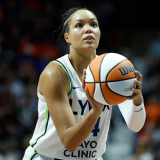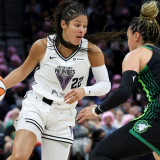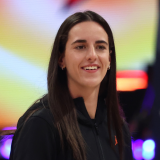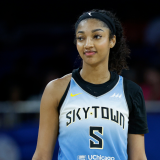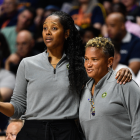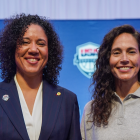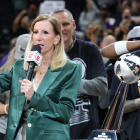WNBA CBA negotiations: Where things stand after All-Star Weekend as potential work stoppage looms
The CBA, which expires Oct. 31, was a major topic in Indianapolis over the weekend
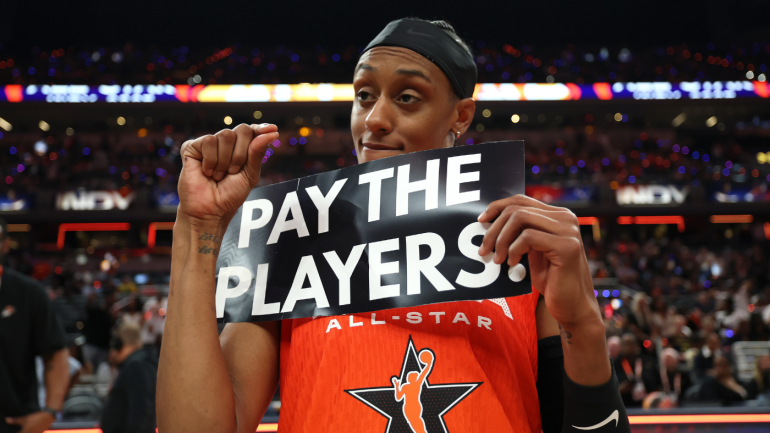
INDIANAPOLIS -- Ahead of the 2025 WNBA All-Star Game, players donned black warmup shirts that read "PAY US WHAT YOU OWE US" in white lettering. The Women's National Basketball Players Association (WNBPA) logo appears on the shirt. Behind the Team Caitlin Clark bench, WNBPA staff members and fans held signs that read "PAY THE PLAYERS."
An hour earlier, WNBA commissioner Cathy Engelbert told media that Thursday's in-person meeting with the WNBPA staff and over 40 players was "productive" and yielded "constructive conversations."
"I remain confident that we will reach a new CBA, one that's transformational for the players, teams, owners, and the future," Engelbert said.
By the conclusion of the game, a few signs made their way around the arena, as did "Pay them!" chants when Engelbert went to the court to present Minnesota Lynx forward and WNBPA executive vice president Napheesa Collier with the game's MVP honor. Washington Mystics guard Brittney Sykes was seen on the national broadcast holding a sign as Collier spoke postgame.
If the players association felt the league wasn't listening before, actions over All-Star Weekend helped force the issue. While the WNBPA has always said a lockout is on the table, the players have also maintained that is the least-desired option used only if all other options have failed.
The current CBA expires Oct. 31 after the players used an opt-out clause last October. CBS Sports has been following the trajectory of the contract negotiations for months. Here's what we know about the status of the negotiations and what could possibly come next.
A league on the rise
The WNBA has seen undeniable growth in the past few years. Key year-over-year numbers continue to increase and the data suggests the rise may be sustainable.
"I have a mantra every year. This year it was: sustain and gain. Sustain the momentum and gain off of it. That's what we've done. National viewership is up 23% year-over-year. Attendance is up 26%, the highest in decades. We're seeing sold-out arenas becoming routine," Engelbert said during her remarks Saturday.
Growth has also included highlighting regular-season games in larger arenas, as well as tapping into the Canadian market ahead of the Toronto Tempo joining the league next season. Fans are engaging with the WNBA at every turn, or better yet, every sales point.
"I was at Tuesday night's in Boston and Wednesday night's game in New York," Engelbert added. "Those were playoff atmospheres. Merch sales have shattered previous records, up 40%, driven by rookie sensations coming in this year and veterans. All-Star Voting Presented by Ally, one of their first activations with us, doubled from last year, up triple digits, 100% plus with millions of fans making their voices heard."
In June, the WNBA announced three additional expansion teams set to join the league by 2030. Cleveland, Detroit, and Philadelphia each paid a record $250 million expansion fee, that is double what the Portland and Toronto franchises reportedly paid to enter the league in 2026. It is also five times the value of the Golden State Valkyries' expansion fee.
Additionally, the league inked a $2.2 billion multiyear broadcast deal that will go into effect next season, and a $75 million capital raise in 2022. All while individual team valuations are going up.
It would appear everything is coming up roses for the WNBA. With regard to CBA negotiations, the context, impact, and the financial outlook and viability of the WNBA appears to be up for interpretation.
Follow the money
The WNBA continues to show and be proud of the gains they are making to become a viable business, something Engelbert has said consistently throughout her tenure. That has undoubtedly happened. Yet there is ongoing tension when it comes to how these gains should be reflected in salary increases and revenue sharing in the current negotiations.
Part of that comes from what the WNBPA has said is a lack of transparency. The NBA owns upward of 60% of the WNBA and as such holds the purse strings. The women's basketball league has limited autonomy in various business decisions, including broadcast rights negotiations.
"The NBA and WNBA resemble a joint venture in which the league's individual finances are not transparent to the public. The NBA owns around half of the WNBA and helps apportion money between the two leagues," Harvard professor and WNBPA advisor Claudia Goldin wrote in a New York Times opinion piece. "Last year the NBA negotiated joint television contracts for the leagues, in which Disney, NBC and Amazon Prime Video agreed to pay the two leagues roughly $77 billion for the right to show their games over 11 years. The gap in player salaries appears to reflect the highly unequal way that NBA owners divide the leagues' revenue."
Goldin estimates that given viewership and attendance data available, salaries for the women's league should be roughly one-quarter to one-third of the salaries on the men's side. The actual gap for the average salaries between the leagues is more than a $9.8 million, or one-eightieth in fractions.
"How could that be? The most likely explanation is that the WNBA is not receiving the full value it contributes to the combined NBA and WNBA enterprise revenue. NBA owners claim that they lose money on the WNBA, yet the recent willingness of investors to pay high sums for WNBA expansion teams suggests the opposite. In the leagues' joint venture, management is not giving the WNBA enough credit for the attention and money its players attract," the Nobel Prize-winning economist wrote.
While Goldin and others question the validity of the year-over-year losses reported by the WNBA, Engelbert maintains that part of a transformational growth model is working within a sustainable budget. In 2018, NBA commissioner Adam Silver reported the WNBA loses its parent company $10 million per year, and last year two sources told The Washington Post the WNBA would lose $50 million.
"We've been building a new economic model, quite frankly, leading women's sports to build that model with our new media rights deals with all the corporate partnerships. So yes, we want to have a fair deal for all, but it has to be within the confines of a sustainable economic model," the WNBA commissioner said at the 2025 Draft.
The league had long pointed to the sustainable economic model as the reason against charter flights, but ahead of last season Engelbert approved the expense of more than $20 million. Engelbert pointed to the league's recent "hyper growth" as the justification for the program.
"I'm glad we did it. And obviously we're going to continue that hopefully for many, many years going forward. But … we need to continue to make sure that we can fund the things that the players are asking for, that we want for them to we all want the players to make more money. That will happen," she added, referring directly to salary conversations in the current CBA negotiations.
The charter programs were implemented outside of the CBA and have yet to be officially ratified.
The hyper-growth Engelbert used to enact charter flights is what the players are eyeing when it comes to their requests for higher salaries. Although the players are not asking for equal pay to their NBA counterparts in this deal, they are demanding an equal revenue share model and salaries that are a more equitable representation of the WNBA's financial growth.
En route to a lockout?
Although things appear rocky between the league and the players association now, that doesn't necessarily mean the two sides won't come together. The plan for the players was always to opt out early and give themselves as much time as possible to discuss options with the league.
"We opted out early to start things going, and so we're using time to our advantage here," WNBPA executive director Terri Carmichael Jackson told reporters at an event in New York on May 1. "We're hopeful that the league and the team see it that way also." Jackson also relayed that the players were hopeful there would be meaningful progress by the midway point of the season.
After the weekend, that seems unlikely. What happens in the next three months will determine whether the players determine a work stoppage is necessary. The players are working toward a resolution by their current contract expiration date of Oct. 31. The 2025 WNBA Finals will wrap up by Oct. 19 at the latest.
"Everybody understands that this CBA expires October 31st so with that in mind, what the players have also said is, by the time we get to the midpoint of our season, which is All-Star and all the things right, that we better have some significant progress. They've also said October 31 is a real deadline, and we need to operate with that in mind ... and, you know, it's a group project. We're doing our part of it, and we're just hopeful that the league sees the opportunity to have those kinds of milestones," Jackson added.
She added the Oct. 31 date is a real deadline and players have prepared for what comes next if there isn't a worthwhile deal, from their vantage point, ready to sign by the fall.
Should the talks stall out, there are other leagues cropping up that can help WNBA players stay physically and financially fit. A lockout could see players look strongly to the overseas market as they did before the league increased salaries and implemented WNBA prioritization in the preceding collective bargaining agreement.
Another alternative could be to work with domestic leagues such as Athletes Unlimited and Unrivaled to perhaps offer even more opportunities stateside. Currently, AU Pro Basketball provides 40 players with an accelerated five-week season. In its inaugural season, Unrivaled signed 36 players for its eight-week 3x3 league.
Unrivaled co-founders Breanna Stewart and Collier shared the WNBA and Engelbert herself were supportive of their startup league, even making connections with sponsors ahead of their first season.
"From the beginning, the W was super supportive," Collier told media in January. "We're a startup, and we talked to Cathy a lot in the beginning. She has experience running a league, so she was really helpful, just in connecting us with vendors and things like that," she added.
However, the league may have changed its tune. First-time All-Star Gabby Williams expressed concern about the WNBA perhaps wanting other entities to fail.
"It's very clear that the league wants to push away all other leagues without still paying us more than those leagues pay us," Williams told media on Friday. The 2024 Olympic silver medalist has played overseas, including with Team France. Williams has been vocal about the impact of the prioritization rule implemented in the last CBA and its impact on International players such as herself.
A contributing factor to the Nevada-born Williams making her first All-Star Game despite being drafted fourth overall in 2018 is because WNBA salaries pale in comparison to what she can make overseas, especially when the league's prioritization rule has made it more difficult to do both.
"It would make sense if they were paying us more here. But it still isn't the case, even with the new proposals, and it's very clear now that they want to push Unrivaled out, push AU out. They want to do it as much as possible. So I think now more than ever, it's really important to push against these kinds of issues," Williams said.
WNBPA executive secretary Elizabeth Williams says the union hasn't had formal conversations with Athletes Unlimited nor Unrivaled about partnerships, should their be a lockout.
"I think we're fortunate that there are domestic leagues that provide compensation for us in the offseason, and we still want to take advantage of player programs as well," she said.
"We've had conversations about the possibility of a work stoppage since before the opt-out date, because that's something you talk about when you're even choosing to opt out. It's like, if you if you choose to opt out, you still got to negotiate a whole other contract. So we as players have had that conversation before, but hopefully we don't even get to that point."
Before the weekend, Engelbert insisted the league will not negotiate in the media, and other than the 2025 WNBA Draft in April and the All-Star Game over the weekend, the commissioner hasn't spoken about the negotiation process, and even then, not with any specifics.
After the weekend, it would appear the WNBPA is ramping up its appeal to the court of public opinion. Ultimately, the negotiations will also include another stakeholder: WNBA owners. We have seen ownership groups split on financial topics such as charter flights in the past. Often the split is seen between independent ownership groups and ownership groups affiliated with NBA franchises.
CBS Sports reached out to the WNBPA and the WNBA for comment on our reporting ahead of All-Star Weekend. Although the WNBPA did not directly respond for comment, the union did release a statement.
"The WNBA's response to our proposals fails to address the priorities we've voiced from the day we opted out: a transformational CBA that delivers our rightful share of the business that we've built, improves working conditions and ensures the success we create lifts both today's players and the generations that follow," the Player's Association said in a statement Thursday.
"We've told the league and teams exactly why their proposal falls so short. This business is booming -- media rights, ratings, revenue, team valuations, expansion fees, attendance and ticket sales are all up in historic fashion. But short-changing the working women who make this business possible stalls growth."
A league spokesperson, meanwhile, offered the following statement to CBS Sports: "The WNBA continues to meet regularly with the Women's National Basketball Players Association as part of the ongoing collective bargaining discussions and is committed to maintaining a respectful and collaborative process. We remain focused on reaching a new agreement that will be transformational and will reflect the progress the league has made and the shared goals of the players and our teams."
At the midway point what we know is there is still plenty of negotiating left to do in the next three months. Whether a new deal is struck or the players opt for a work stoppage, it will be historic for a league set to reach its 30th anniversary next season.


